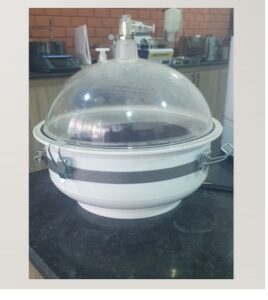NBRRI Vacuum Pycnometer: Accurate Density and Specific Gravity Measurement
 NBRRI Vacuum Pycnometer
NBRRI Vacuum Pycnometer is a precision instrument used by the
Nigerian Building and Road Research Institute (NBRRI), designed for measuring the
density and
specific gravity of solid materials, particularly those with irregular shapes, high porosity, or complex internal structures. This advanced device uses
vacuum technology to obtain accurate measurements, offering significant advantages over traditional methods of density determination.
Key Features of the NBRRI Vacuum Pycnometer
- Vacuum-Based Measurement
The NBRRI Vacuum Pycnometer utilizes a vacuum chamber to remove any air trapped within the pores or voids of the sample material, ensuring that only the material itself is measured. This allows for more accurate measurements of the sample’s true volume and density.
- High Precision
It provides high accuracy and reliability, especially when measuring materials with irregular shapes or high porosity, such as aggregates, soil samples, or certain types of concrete. This is critical for ensuring the quality and suitability of materials in construction applications.
- Versatility
The vacuum pycnometer can be used to measure a wide range of solid materials, including:
- Aggregates (sand, gravel, crushed stone)
- Cement and concrete
- Soils (including clay, loam, and silt)
- Composites and other materials used in construction
- User-Friendly Interface
Modern versions of the pycnometer feature a digital interface, making the device easy to operate. The real-time readouts provide quick results, reducing the likelihood of errors during testing.
- Durable and Reliable Design
The NBRRI Vacuum Pycnometer is built to withstand the conditions of both laboratory and field environments, ensuring long-lasting performance and consistent results.
Applications of the NBRRI Vacuum Pycnometer
The NBRRI Vacuum Pycnometer is primarily used in the
construction,
materials science, and
geotechnical engineering fields. Some of the key applications include:
- Aggregate Testing
It is used to measure the density and specific gravity of aggregates, such as sand, gravel, and crushed stone. These properties are essential for determining the suitability of aggregates for use in concrete production and road construction.
- Soil Testing
The pycnometer is often used to determine the bulk density and porosity of soils. This is particularly useful for assessing soil compaction, permeability, and other properties important for foundation design and road construction.
- Cement and Concrete Quality Control
It plays a vital role in testing the density of cement and concrete mixtures. Accurate density measurements help engineers assess the quality and strength of the concrete, ensuring it meets the required specifications.
- Research and Development
In research settings, the NBRRI Vacuum Pycnometer is used to study new materials, such as advanced composites or recycled aggregates, and assess their density, porosity, and overall suitability for various construction applications.
- Material Selection for Pavement Design
By measuring the density and porosity of different materials, the device helps engineers select the best aggregates and binders for road construction, ensuring the long-term performance and durability of pavements.
Advantages of the NBRRI Vacuum Pycnometer
- Accuracy and Precision
The vacuum method provides much higher accuracy than traditional methods, such as water displacement or mercury immersion, particularly for porous or irregular materials.
- Non-Destructive Testing
The device does not alter or damage the sample during the measurement process, allowing it to be used repeatedly for testing without loss of material.
- Versatility in Materials
The vacuum pycnometer is effective for measuring a wide range of materials, including those with complex structures, high porosity, or irregular shapes, which are often challenging to assess using conventional techniques.
- Speed and Efficiency
The vacuum method is relatively quick, allowing for faster testing and data collection compared to more traditional techniques, improving laboratory throughput.
- Reliability in Harsh Conditions
The robust design of the NBRRI Vacuum Pycnometer makes it suitable for use in a variety of environments, including field testing and construction sites.
Conclusion
The
NBRRI Vacuum Pycnometer is a highly accurate and versatile tool for determining the
density and
specific gravity of solid materials, particularly those with complex internal structures or high porosity. By using vacuum technology to eliminate trapped air, the device provides precise and reliable measurements that are essential for material characterization in
construction,
geotechnical engineering, and
materials science. Its ability to handle a wide range of materials makes it an invaluable tool for
quality control,
research and development, and
asphalt mix design. Despite its higher cost, the NBRRI Vacuum Pycnometer offers significant benefits in terms of precision, non-destructive testing, and efficiency, making it an essential instrument in modern construction and materials testing laboratories.
 NBRRI Vacuum Pycnometer is a precision instrument used by the Nigerian Building and Road Research Institute (NBRRI), designed for measuring the density and specific gravity of solid materials, particularly those with irregular shapes, high porosity, or complex internal structures. This advanced device uses vacuum technology to obtain accurate measurements, offering significant advantages over traditional methods of density determination.
NBRRI Vacuum Pycnometer is a precision instrument used by the Nigerian Building and Road Research Institute (NBRRI), designed for measuring the density and specific gravity of solid materials, particularly those with irregular shapes, high porosity, or complex internal structures. This advanced device uses vacuum technology to obtain accurate measurements, offering significant advantages over traditional methods of density determination.
